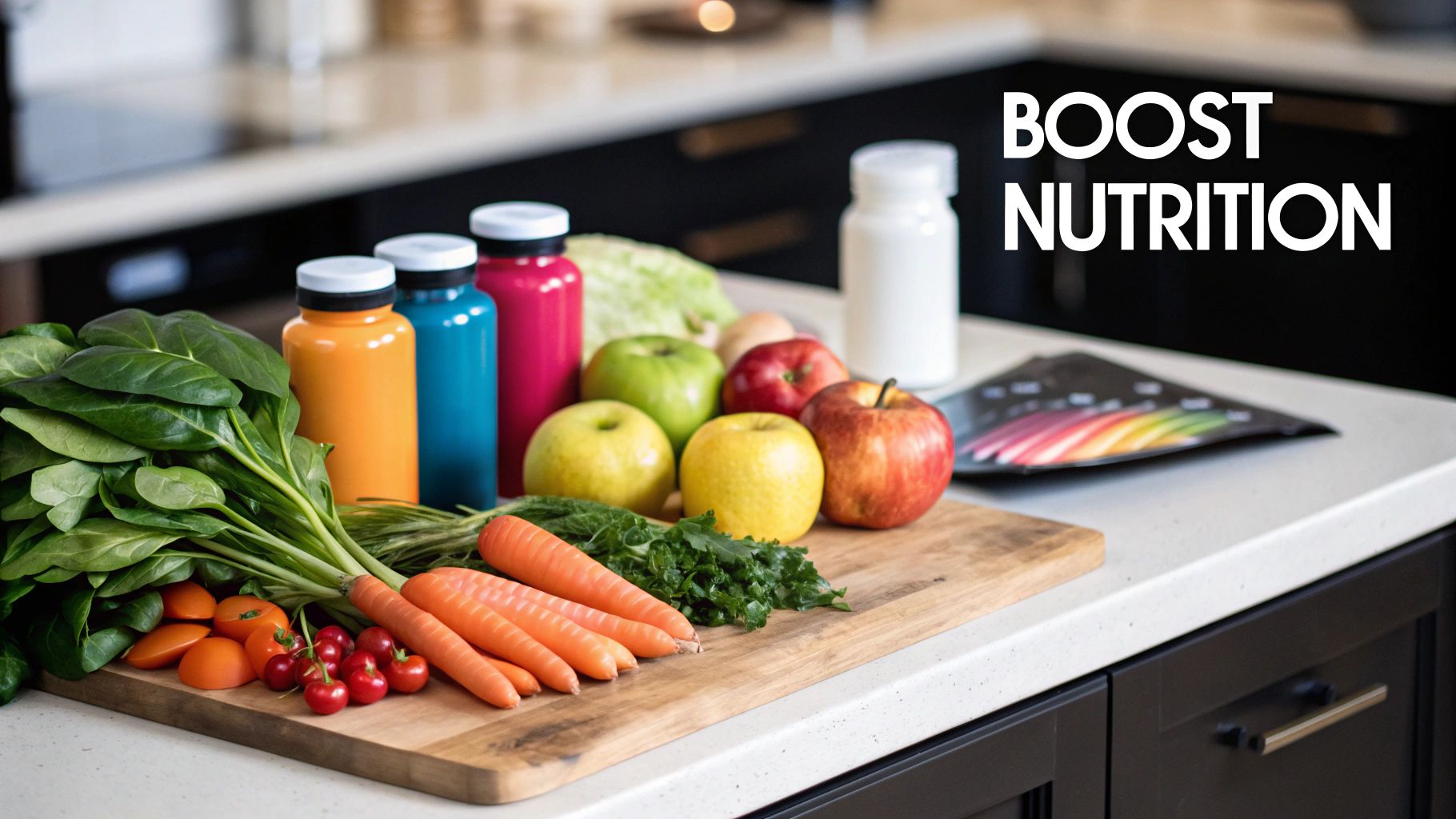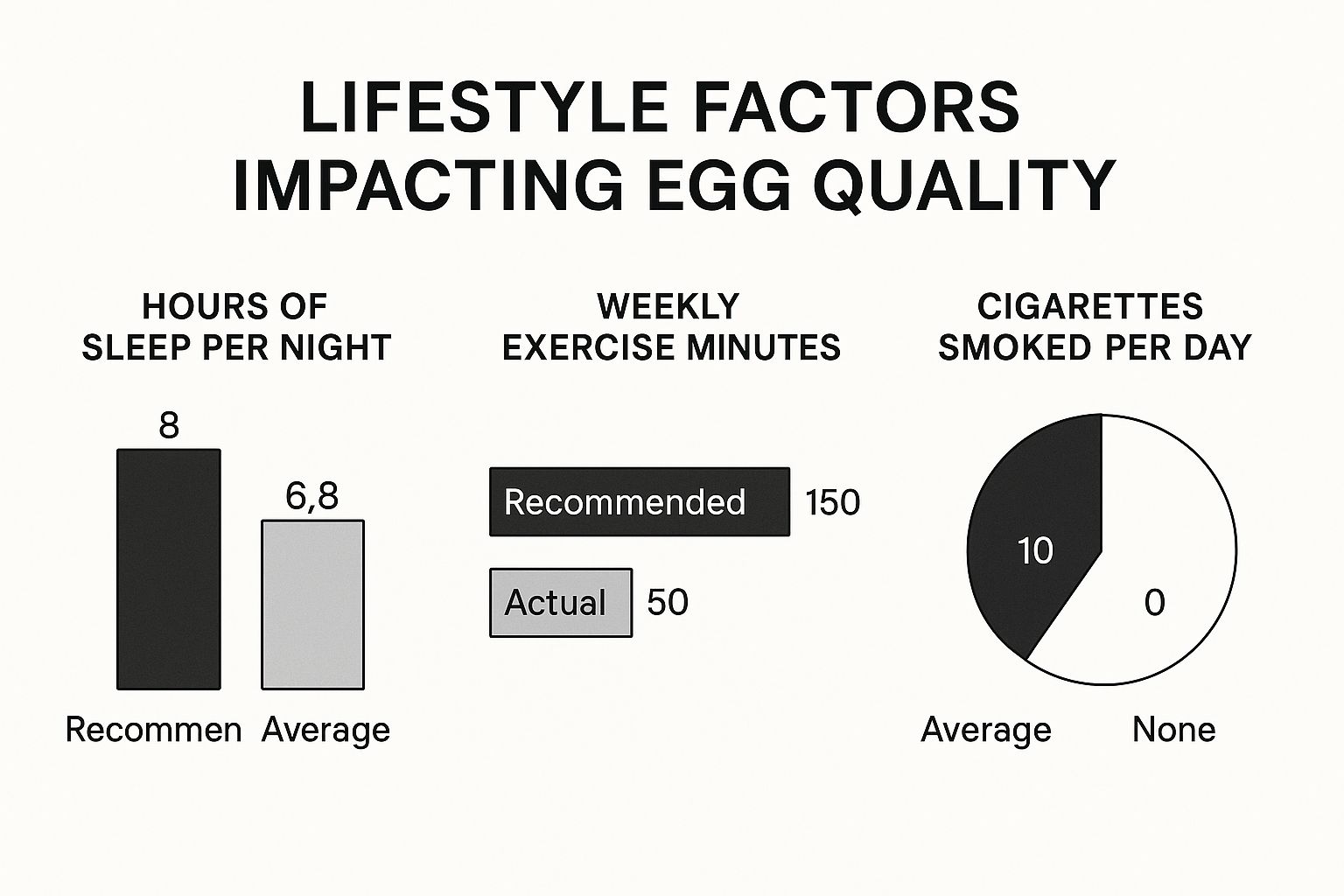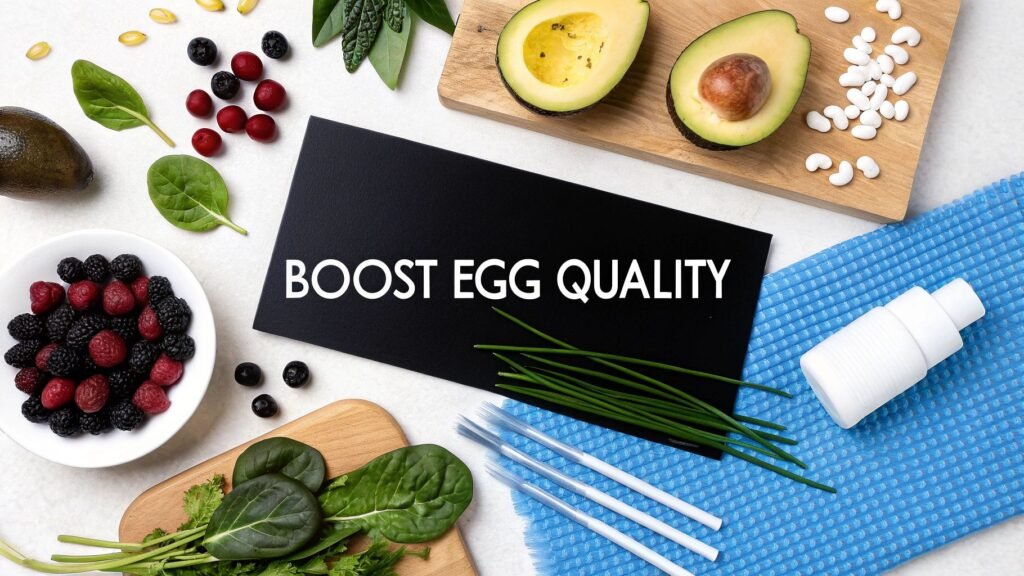When you’re trying to get pregnant, so much of the conversation revolves around your egg count. But what many don't realize is that while the number of eggs is part of the story, the real hero is egg quality.
I like to think of it this way: egg quantity gives you a certain number of lottery tickets each month. Egg quality determines whether any of those tickets are actually winners. A high-quality egg is what truly lays the groundwork for a healthy pregnancy.
Why Egg Quality Is the Real Game-Changer
So, what makes an egg "high quality"? It really comes down to two crucial jobs.
First, a healthy egg (or oocyte) must have the right genetic instructions—precisely 23 chromosomes—ready to pair up with the sperm. Any more or any less, and it can lead to problems.
Second, it needs a massive amount of cellular energy to power the whole show. This energy comes from tiny powerhouses inside the egg called mitochondria. They're the fuel tank for the incredibly demanding journey of fertilization, cell division, and early embryo development.
If either of these is off, an egg might not fertilize properly, or the embryo might not have the stamina to implant and grow. This is exactly why shifting your focus to improving egg quality can be such a powerful move.
Your Window of Opportunity: Age and Lifestyle
Let’s be honest: age is a big factor here. As we get older, the genetic integrity of our eggs naturally starts to decline. It’s a biological reality. In fact, research shows that for women in their early 30s, around 25-30% of their embryos might have genetic abnormalities. That number can jump to over 70% for women over 40, which is a key reason for higher rates of miscarriage and chromosomal issues. You can dive deeper into this topic with the excellent research from RMA of New York.
But here’s the empowering part: age isn’t the only thing at play.
Your eggs go through a maturation cycle that lasts about 90 days before one is finally released at ovulation. This three-month period is your window of opportunity—a chance to directly influence the environment where those eggs are developing. Your diet, stress levels, sleep patterns, and even exposure to everyday toxins all have a direct impact.
The health of your eggs isn't just a fixed biological fact. It's a dynamic process, and you have a real say in it. By focusing on smart nutrition, targeted supplements, and stress reduction, you are actively nurturing the cellular health of your developing eggs.
Making these positive changes helps shield your eggs from oxidative stress (a major cause of cellular damage) and gives them all the building blocks they need to mature properly. It’s about shifting your focus from the one thing you can't change—your age—to the many things you absolutely can control.
Before we get into the "how-to," let's quickly break down the key factors that can either help or hinder your egg quality.
Key Factors That Influence Egg Quality
This table gives a quick look at the primary internal and external factors that impact the health and viability of a woman's eggs.
| Factor | Impact on Egg Quality | Your Level of Influence |
|---|---|---|
| Chronological Age | A primary driver of genetic abnormalities (aneuploidy). | Low (Cannot be changed) |
| Diet & Nutrition | Provides antioxidants and nutrients essential for mitochondrial function and DNA protection. | High (Daily choices) |
| Stress Levels | Chronic stress can disrupt hormonal balance and increase oxidative stress. | High (Manageable with lifestyle changes) |
| Environmental Toxins | Exposure to plastics (BPA), pesticides, and chemicals can harm developing eggs. | Moderate (Can be reduced with awareness) |
| Blood Flow | Adequate circulation delivers oxygen and nutrients to the ovaries. | Moderate (Influenced by exercise & hydration) |
| Underlying Conditions | Issues like PCOS or endometriosis can create an inflammatory environment. | Moderate (Manageable with medical support) |
Understanding these elements helps clarify where your efforts will have the most significant and immediate impact. Now, let's explore the actionable steps you can take to make a difference.
Eating to Nourish Your Oocytes

When we talk about fertility, the conversation often turns to diet. But let's cut through the noise and get straight to what matters for your eggs. The food on your plate provides the literal building blocks and protective shields your oocytes (your eggs) need during their critical 90-day maturation cycle.
Think of it this way: your diet is one of the most powerful tools you have to create an optimal internal environment for your eggs to develop and thrive. The primary goal is to fight back against oxidative stress—a natural process where unstable molecules called free radicals can damage healthy cells, including your eggs. A diet packed with antioxidants is your best defense, neutralizing these free radicals before they can interfere with your egg's delicate DNA.
The Power of a Mediterranean-Style Diet
From my experience, one of the most effective and sustainable nutritional strategies is adopting a Mediterranean way of eating. This isn't a strict, restrictive "diet" but a lifestyle pattern that’s naturally high in antioxidants, anti-inflammatory compounds, and healthy fats. It’s a perfect storm for reproductive health.
It all boils down to building your meals around whole, nutrient-dense foods:
- A rainbow of fruits and vegetables at every meal.
- Healthy fats from sources like rich olive oil, avocados, nuts, and seeds.
- Lean proteins, including fatty fish, poultry, and plant-based options like beans and lentils.
- Complex, whole grains such as quinoa, brown rice, and old-fashioned oats.
This approach ensures a steady supply of the vitamins and minerals that fuel the energy production inside the egg and protect its genetic material.
Key Nutrients and Where to Find Them
Let’s make this practical. Avocados, for instance, are practically famous in the fertility world, and for good reason. They are loaded with monounsaturated fats, which are fantastic for taming inflammation and supporting healthy hormone production.
Berries—blueberries, strawberries, raspberries—are antioxidant powerhouses. They’re full of compounds called anthocyanins, which not only give them their beautiful colors but also help shield your eggs from cellular damage.
Then you have your dark leafy greens like spinach, kale, and Swiss chard. These are brimming with folate, a B-vitamin that is absolutely essential. While it's known for preventing neural tube defects later on, its job starts much earlier by supporting proper cell division as the egg matures.
Your grocery cart is the first stop on your journey to improving egg quality. Every colorful fruit, leafy green, and healthy fat you add is a direct investment in your cellular health and reproductive potential.
Getting these foods into your diet doesn't need to be a chore. Toss a handful of spinach into your morning smoothie, top your yogurt with a scoop of berries, or simply snack on an avocado with a little sea salt. It's also worth exploring the top plant-based protein sources to add variety and power to your meals.
The Impact of Healthy Fats on Egg Quality
Let's talk a bit more about fat. Healthy fats, especially omega-3 fatty acids, are non-negotiable for egg health. They are a core component of cell membranes, keeping them flexible and able to respond to crucial hormonal signals. You'll find these incredible fats in salmon, mackerel, and sardines, as well as in plant-based sources like chia seeds, flaxseeds, and walnuts.
The science on this is compelling. Research consistently shows that omega-3s can have a real impact on oocyte quality. One study in mice, for example, found that supplementing an aging population with DHA (an omega-3) had a remarkable effect. The mice getting DHA produced mature eggs at a rate of about 44%, while the control group only managed 13%. That’s a significant difference.
Foods to Limit for Better Egg Health
What you don't eat is just as important as what you do. Highly processed foods, refined sugars, and unhealthy trans fats can fuel an inflammatory fire inside your body. Chronic inflammation is a known enemy of fertility, capable of disrupting hormones and dialing up the oxidative stress on your ovaries and eggs.
Try to consciously reduce your intake of:
- Sugary drinks and snacks (soda, candy, most baked goods)
- Refined carbohydrates (white bread, white pasta, white rice)
- Processed meats (bacon, sausage, deli meats)
- Foods with trans fats (often in fried foods and packaged snacks)
Remember, this isn't about being perfect. It's about progress. Swapping your usual sugary cereal for a bowl of oatmeal with berries is a win. Choosing whole-grain bread for your sandwich is a step in the right direction. These small, consistent choices really add up.
Your Fertility-Boosting Grocery List
To make it easy, here’s a quick-glance guide for your next grocery run. Stocking your kitchen with these items is a fantastic way to set yourself up for success.
| Category | Recommended Foods | Why It Helps |
|---|---|---|
| Fruits | Blueberries, raspberries, pomegranates, oranges | Rich in antioxidants to fight oxidative stress. |
| Vegetables | Spinach, kale, broccoli, sweet potatoes, bell peppers | High in folate, vitamins, and minerals. |
| Healthy Fats | Avocados, olive oil, walnuts, almonds, chia seeds | Reduces inflammation and supports hormones. |
| Lean Proteins | Salmon, chicken breast, lentils, chickpeas, eggs | Provides amino acids for cell growth and repair. |
| Whole Grains | Quinoa, oats, brown rice, whole-wheat bread | Offers fiber and sustained energy release. |
By making these foods the foundation of your diet, you're not just eating for general wellness—you are strategically giving your body exactly what it needs to produce the best quality eggs possible.
Using Supplements to Enhance Egg Viability
While a nutrient-rich diet is the undeniable foundation for healthy eggs, smart, strategic supplementation can give you a powerful, targeted edge. Think of it as providing specialized support during the critical 90-day window when your eggs are maturing.
I know the world of fertility supplements can feel overwhelming. It's easy to get lost in a sea of bottles and promises. The key is to cut through the noise and focus on a handful of key players backed by solid research. They can provide the specific building blocks your eggs need to thrive.
But first, a crucial point: always talk to your doctor or fertility specialist before starting any new supplement. This isn't just a formality. They can run bloodwork to see what you actually need and recommend dosages that are right for your body. Self-prescribing can be counterproductive, so let's work with your healthcare team.
Coenzyme Q10: The Cellular Energizer
If there's one supplement that consistently earns its place at the top of the list for egg quality, it's Coenzyme Q10 (CoQ10). This is a naturally occurring antioxidant that works inside your mitochondria—the tiny "power plants" inside every cell.
Here's why that matters so much: an egg cell contains more mitochondria than any other cell in the human body. That’s a clue to just how much energy it needs to mature properly, maintain chromosomal stability, and power through fertilization and early cell division. As we get older, our natural CoQ10 levels drop, which can starve the egg of the energy it desperately needs.
Supplementing with CoQ10, especially in its more bioavailable form, ubiquinol, helps recharge those cellular batteries. By refueling the mitochondria, you're giving your eggs the best possible chance to complete their monumental task successfully.
It helps to think of CoQ10 as a high-octane fuel additive for your egg's engine. It doesn't change the engine itself, but it ensures it runs as efficiently and powerfully as possible, which is critical for the long journey ahead.

The image above really drives home the point. It shows the common gaps between what's ideal for our health and what we often manage in our busy lives. This is precisely where targeted support from both lifestyle tweaks and smart supplementation can make a real difference.
To make this even clearer, here's a quick look at some of the most recommended supplements I see in my practice and in the research.
Top Supplements for Improving Egg Quality
Here’s a comparative overview of some of the most researched supplements for supporting egg health.
| Supplement | Primary Function | Typical Dosage Range (Consult a Doctor) | Key Research Finding |
|---|---|---|---|
| Coenzyme Q10 (Ubiquinol) | Boosts mitochondrial energy production in egg cells. | 100-600 mg daily | Studies suggest it may improve egg quality and embryo quality, particularly in women over 35. |
| Myo-Inositol | Improves insulin sensitivity and supports follicular development. | 2-4 grams daily | Particularly effective for women with PCOS, helping to regulate cycles and support oocyte maturation. |
| Vitamin D | Acts as a hormone to regulate reproductive functions. | 1,000-4,000 IU daily | Deficiency is linked to poorer IVF outcomes; sufficient levels are associated with better ovarian function. |
| Omega-3 Fatty Acids (DHA/EPA) | Reduces inflammation and supports overall cellular health. | 600-1,200 mg daily | Helps improve blood flow to the ovaries and may extend ovarian reserve. |
Remember, these are just common ranges. Your personal dosage should always be determined by a healthcare professional based on your individual needs.
Myo-Inositol for Hormonal Harmony
Myo-inositol is another game-changer, especially for women with Polycystic Ovary Syndrome (PCOS), though its benefits are much broader. It’s a type of B-vitamin that is absolutely vital for how your body responds to insulin and for the cell-signaling pathways that tell your follicles when to grow.
When your body struggles with insulin resistance (a hallmark of PCOS), it can throw your reproductive hormones into chaos, disrupting ovulation and compromising egg development. Myo-inositol helps get things back on track by improving your body's insulin sensitivity. This, in turn, helps restore hormonal balance and promotes healthier, more regular cycles.
From an egg-quality perspective, it directly supports the environment within the follicle where the egg matures, helping to create the ideal conditions for a healthy oocyte.
Vitamin D: The Sunshine Vitamin
It’s easy to overlook Vitamin D, but it's a powerhouse for fertility. It’s not just a vitamin; it’s a steroid hormone, and your reproductive system—including your ovaries and uterus—is loaded with Vitamin D receptors. That tells us it plays a major role.
Research has consistently linked sufficient Vitamin D levels to better IVF outcomes and improved ovarian function. While we're still learning the exact mechanisms, experts believe it helps regulate key reproductive hormones, keeps inflammation in check, and supports the growth of healthy follicles.
So many of us are deficient, particularly if we live in climates without year-round sun. A simple blood test can tell you where you stand, and your doctor can recommend the right dose to get you to an optimal level. It's such a simple fix with a potentially huge impact.
Other Supportive Supplements and Herbs
Beyond these heavy hitters, a few other things can round out your regimen.
- A high-quality prenatal vitamin is non-negotiable. It provides a solid baseline of essential nutrients like folate, which is critical for preventing birth defects and supporting the rapid cell division that happens right after conception.
- Omega-3 fatty acids, especially DHA, are fantastic for their anti-inflammatory effects and their role in building healthy cell membranes.
For those open to traditional medicine, herbal remedies can also offer another layer of support. If you're curious, you can explore this guide on the best herbs for fertility. When used under the guidance of a qualified practitioner, they can be a wonderful complement to your plan. The goal is to build a smart, personalized routine that gives your eggs everything they need to be their absolute best.
How Stress and Lifestyle Affect Your Eggs

When you're trying to conceive, hearing someone say "just relax" can feel incredibly dismissive. But let's move past that unhelpful advice and talk about the very real, physiological connection between your daily life, your stress levels, and the health of your eggs. The truth is, your lifestyle shapes the internal environment where your eggs mature, making it a powerful place to focus when you're learning how to improve egg quality.
Chronic stress isn't just in your head; it triggers a cascade of physical responses. When you’re constantly under pressure, your body releases the stress hormone cortisol. This can directly interfere with the delicate hormonal balance required for ovulation and healthy egg development. Essentially, high cortisol levels send a signal to your reproductive system that it's not a safe or ideal time to get pregnant.
This constant state of alert also cranks up oxidative stress throughout your body—a primary enemy of cellular health. Your eggs are especially vulnerable during their 90-day maturation window, and a high-stress environment can seriously compromise their vitality.
Practical Stress Management That Fits Your Life
Managing stress doesn't require quitting your job or booking a month-long silent retreat. It’s really about weaving small, sustainable practices into your daily routine that help downshift your nervous system and bring those cortisol levels back to baseline. The goal isn't to eliminate stress, but to build your resilience to it.
Here are a few effective strategies that I've seen work for countless clients:
- Mindfulness and Meditation: Even five to ten minutes a day can make a world of difference. Mindfulness pulls you into the present moment instead of letting you get tangled in worries about what’s next. You might want to explore some guided stress-reducing meditation techniques to get started.
- Gentle Movement: Think yoga, tai chi, or just a walk in a park. Unlike intense workouts that can sometimes spike cortisol, gentle movement helps your body process stress hormones while boosting blood flow to your reproductive organs.
- Journaling: It sounds simple, but writing down your thoughts and fears is a powerful way to get them out of your head. This act of externalizing your worries can bring a surprising amount of clarity and lighten your mental load.
For a deeper look at this, our guide on how to cope with stress offers even more practical tips. The key is finding what feels good to you so you can stick with it.
The Critical Role of Sleep in Hormone Regulation
Sleep is when your body does its most important repair and regulation work, especially for your hormones. A lack of quality sleep can throw off the production of luteinizing hormone (LH) and follicle-stimulating hormone (FSH)—two key players that trigger ovulation and egg maturation.
Aiming for 7-9 hours of quality sleep each night is one of the most impactful changes you can make. It helps balance cortisol, supports hormone production, and gives your body the downtime it desperately needs to function at its best.
Think of sleep as your body's nightly reset button for hormonal balance. Skimping on sleep is like asking your reproductive system to run a marathon without any rest—it simply can't perform at its best.
To get better shut-eye, start creating a simple wind-down routine. Dim the lights, put your phone away at least an hour before bed, and turn your bedroom into a cool, dark, and quiet sanctuary.
Making Smart Choices About Exercise and Toxins
While gentle movement is a plus, it's all about finding the right balance. Over-exercising can actually put your body into a stress state, diverting precious energy and resources away from your reproductive system.
For most people, the sweet spot is moderate, low-impact exercise—like swimming, cycling, or brisk walking—for about 30-40 minutes, most days of the week. This boosts circulation to the ovaries without pushing your system too hard.
Finally, let’s talk about reducing your exposure to environmental toxins. This is a proactive step that can have a big impact. Endocrine-disrupting chemicals (EDCs), which are surprisingly common in everyday products, can mimic hormones and interfere with your reproductive health.
You can lower your exposure with a few simple swaps:
- Ditch the plastic for food storage and water bottles. Switch to glass or stainless steel to avoid BPAs and phthalates.
- Choose natural cleaning and beauty products to cut down on contact with harsh chemicals.
- Go organic with your produce when you can to minimize pesticide residue.
By consciously managing stress, prioritizing sleep, moving your body wisely, and reducing your toxic load, you create a nurturing environment that gives your eggs the best possible chance to thrive.
Holistic Therapies That Support Fertility

Making changes to your diet, supplements, and lifestyle is absolutely foundational. But for many people, weaving in complementary therapies like acupuncture and herbal medicine adds a powerful, supportive layer to their fertility plan. These practices have been trusted for centuries for a reason—they work beautifully alongside modern approaches.
Holistic therapies come at reproductive health from a completely different angle. The focus is on creating balance, improving blood flow, and tapping into the body's own energy systems. When you’re working to improve egg quality, these ancient practices can help create the ideal internal environment for your eggs to mature.
How Acupuncture Can Enhance Your Fertility
Acupuncture is often the first holistic therapy people turn to on their fertility journey, and there’s a good reason for its popularity. This practice involves placing incredibly thin, sterile needles at specific points on the body to stimulate what are known as meridians, or energy pathways.
From a fertility standpoint, the benefits are thought to be threefold:
- Boosting Ovarian Blood Flow: This is probably the most significant benefit. The idea is to improve circulation right where it counts—the ovaries. Better blood flow means more oxygen and nutrients are delivered directly to your developing follicles.
- Balancing Hormones: By stimulating specific points, acupuncture can help gently nudge your endocrine system back into balance. This promotes the kind of stable, predictable hormonal rhythm that's essential for healthy egg maturation.
- Reducing Stress: We already know that chronic stress is a major fertility disruptor. An acupuncture session itself is profoundly relaxing, helping to lower those sky-high cortisol levels and shift your body out of a "fight or flight" state.
Plenty of research has explored its effectiveness, with promising results for women going through fertility treatments. It's a gentle but powerful way to optimize your body’s internal landscape.
What to Expect During an Acupuncture Session
If you've never tried acupuncture, it’s completely normal to feel a bit nervous. Your first visit will start with a deep dive into your health history. The practitioner will ask about everything—your cycles, diet, sleep, and stress levels—to build a treatment plan just for you.
When the needles go in, you might feel a tiny pinch or a dull, heavy sensation, but most people barely feel a thing. Once the needles are set, you'll simply lie back and relax for about 20-30 minutes. Most of my clients leave feeling incredibly calm and centered. The key is finding the right person, and our guide on the best acupuncture for fertility can help you find a great practitioner.
The Role of Traditional Chinese Medicine and Herbs
Acupuncture is just one piece of the much larger puzzle of Traditional Chinese Medicine (TCM). Within this system, egg quality is deeply connected to the health of your Kidney Jing, which you can think of as your reproductive essence or your foundational life force.
In TCM, your Kidney Jing is like a deep well of vital energy that you are born with. Lifestyle choices can either deplete this well or help preserve and nourish it. Improving egg quality is about replenishing this foundational essence.
A licensed herbalist can create a custom herbal formula designed specifically for your body's needs. These aren't just single herbs thrown together; they are complex, synergistic blends of botanicals designed to nourish blood, build up Jing, and balance the Yin and Yang energies in your system.
It’s a truly personalized approach. Your practitioner will select herbs based on your unique constitution and where you are in your cycle, adjusting the formula as your body changes. When you're working with a trained professional, herbal medicine can be a wonderfully safe and effective way to give your body deep, systemic support on your path to conception.
Answering Your Biggest Questions About Egg Quality
When you're trying to conceive, questions can pop up at every turn. It's completely normal to wonder about timelines, age, and all the "what-ifs." Let's walk through some of the most common questions I hear from my patients so you can move forward with clarity and confidence.
How Long Does It Really Take to See a Difference?
This is the big one, and the answer is rooted in the egg's natural lifecycle. Think of it this way: the egg you ovulate this month started its final maturation journey about 90 days ago. This three-month window is your golden opportunity to make an impact.
That’s why any meaningful changes to your diet, supplement routine, or lifestyle need to be consistent for at least three months. It’s not about a quick fix; it’s about creating a healthier, more nourishing environment for your eggs to develop in over time. This sustained effort is what truly moves the needle.
Can I Still Improve My Egg Quality After 40?
Absolutely. While you can't turn back the clock on age, you have a tremendous amount of influence over the environment your eggs are maturing in right now. For women over 40, this becomes even more essential.
The focus shifts to protecting the eggs you have. Strategies like loading up on antioxidants, taking targeted supplements like CoQ10, and actively managing stress are no longer just "nice-to-haves"—they're your front-line defense against cellular damage. You're giving every single egg its best possible chance to thrive.
We see the powerful link between egg quality and age play out in IVF. When women over 40 use donor eggs from younger women, success rates jump significantly. This really highlights how vital egg health is for a successful pregnancy. You can dig deeper into the numbers by reviewing these IVF success rates and statistics.
Does My Partner’s Health Really Affect My Eggs?
Yes, a thousand times yes. While this guide is focused on your eggs, making a baby is a team effort. The health of the sperm is just as critical as the health of the egg.
It’s crucial that your partner is on the same page, optimizing their health right alongside you. Their diet, stress, and lifestyle directly influence sperm count, motility, and DNA integrity. When you improve both sides of the equation, you dramatically increase your chances of creating a healthy embryo. This is a journey you should be on together.
At Eric Tsai Acupuncture and Herbs, my mission is to provide you with personalized, compassionate care on your path to parenthood. If you're ready for an integrative approach that blends traditional wisdom with modern science to support your fertility, I invite you to learn more about our services.

